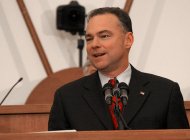7/19/2007
Virginia Governor, Speaker Defend New Speeding Ticket FinesThe legislative leadership in Virginia embraced the speeding ticket tax despite growing outrage from voters.

Virginia's Democrat Governor Tim Kaine today joined the Republican leadership of the state legislature to defend and embrace the controversial "civil remedial fees" or speeding ticket tax that took effect at the beginning of the month (fee details). Kaine and House Speaker William J. Howell (R-Stafford) together refused to call a special session for the repeal of the unpopular fines. Instead, the pair promised to "fix" concerns by applying fees to non-residents -- effectively doubling the amount of revenue collected. Neither will consider acting before the legislature reconvenes in January 2008.
Kaine and the other leaders said that a growing petition signed so far by 3.3 percent of the state's registered voters -- 140,000 motorists -- was the result of the public's ignorance of the new law and "misinformation." (view petition)
"Abuser fees are not applicable to drivers who commit only minor traffic infractions," Howell insisted.
Left unsaid was that the Virginia Code turns what other states treat as ordinary traffic infractions into serious misdemeanors that carry punishments that can include up to a year in jail and a maximum fine of $2500 -- before including the new "abuser fees" of $900 to $3000. Last year, one out of every three motorists appearing in traffic court faced a misdemeanor charge. There were 776,045 traffic infractions and 424,936 traffic misdemeanors in general district courts. In 2005, the financial yield of the 1.2 million traffic tickets collected by the courts was $56,640,042 for the state and $52,673,389 for localities from fines alone. Including all revenue sources, the courts collected $246,552,351 leaving a net profit of $173,738,097 after expenses of $72,814,254.
"Contrary to what critics and others committed to unraveling the transportation plan have claimed, there is no such thing as a $3,000 speeding ticket," Howell said.
Although technically not called a "speeding ticket," the maximum penalty for driving more than 20 MPH over the limit (or 15 MPH over in a 65 zone) in Virginia is $3550. This follows from Virginia Code 46.2-862 which states, "A person shall be guilty of reckless driving who drives a motor vehicle... in excess of eighty miles per hour regardless of the applicable maximum speed limit." This is a class one misdemeanor that allows a judge to impose a fine of up to $2500 along with a mandatory $1050 fee that the court has no discretion to reduce. In other words, a motorist could pay a maximum of $3550 if found guilty of this offense.
Other aspects of the reckless driving statute are worded in such a way that a police officer can issue a reckless driving citation to a motorist who wantonly disregards the safety of others by failing to use a turn signal. Virginia Code 46.2-860 states that, "A person shall be guilty of reckless driving who fails to give adequate and timely signals of intention to turn, partly turn, slow down, or stop, as required by Article 6 of this chapter." (view law)
"Safe drivers with only minor traffic infractions or occasional speeding tickets have nothing to fear from the abuser fee legislation," Howell said.
Under the new law, it only takes two ordinary speeding tickets to trigger abuser fees. As a ticket for driving 10 MPH over the limit carries four demerit points, collecting two of them triggers the point tax imposed on drivers who have amassed eight points on their record. This point tax is a $100 charge that must be paid every year for as long as the violation remains on the record. Each additional point above eight adds an extra $75 annual fee up to a maximum of $700 a year. Demerit points can remain on one's record for as long as eleven years for certain offenses.
Because 140,000 voters have asked for a repeal, not a modification, of the fee provision, TheNewspaper is in the process of identifying legislators who support petition signers. Late last week, we emailed every member of the House of Delegates to ask, "Will you support the unconditional and complete repeal of the civil remedial fees enacted by HB 3202?" TheNewspaper intends to publish the responses we have received in an upcoming article.


